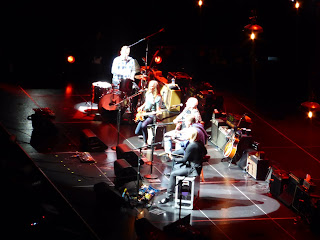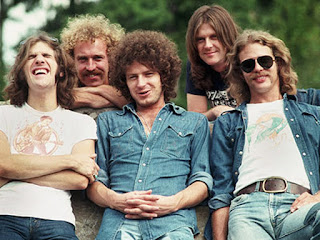 |
| © Simon Poulter 2013 |
As at least one legend has it, the Californian band that met the spotlight in the grimmest of circumstances last November arrived at their moniker after Hughes and Homme saw a man in a London bar dancing to The Scorpions' Wind of Change. The man explained that he was frugging to death metal. "No it's not," Homme is said to have replied. "This is like the Eagles of death metal."
That Homme entertained a play on words around one of America's most revered, representative and also sneered-at rock bands demonstrates a delightful, if unexpected, degree of chutzpah.
To some, the 'original' Eagles are a brand of corporate rock and roll, as familiar as Starbucks or as predictable as a Ford car. Punk, which was very angry about many things, had bands like the Eagles in its sights for this very reason, as well as the post-hippie prevelence for chambray shirts, denim and centre-parted hair.
It should also be noted that punk really erupted in 1976, the year that the Eagles released their biggest selling album, Hotel California, the title track of which remains today their most defining, and itself was a somewhat punkish rejection of the plastic facade that was LA life back then.
Even now, the Eagles generate caustic derision from those of a reactionary bent, agitated by their gentle, unprepossesing country rock and the "peaceful, easy feeling" of their soft harmonies and readiness for narcoleptic FM radio. This, they say, is music "only unadventurous Americans could like".
However, the unexpected death yesterday of the Eagles founder member Glenn Frey triggers reconsideration of one of the most extroardinary periods in the storied history of California's musical timeline.
Whenever I've been asked to name a period that I would have most liked to have lived in, it is never Shakespeare's England (plague, smallpox and syphillis...?), Dickens' London or The Beatles' Liverpool, but the canyons in the Hollwood Hills in the late 1960s. For then, as Barney Hopkins' essential read Hotel California: Singer-Songwriters And Cocaine Cowboys In The L.A. Canyons 1967-1976 details, you had the confluence of rock, country and folk in Laurel Canyon or Malibu Canyon, with the likes of The Byrds, Buffalo Springfield, The Doors and Joni Mitchell hanging out, creating beautiful things.
LA was an incredible hotbed of music, the southern Californian sunshine fertilising what had become a giant campus for songwriters and session players, where everyone knew everyone everyone - CSN&Y, Linda Ronstadt, Gram Parsons, the Flying Burrito Brothers, Poco, Randy Newman, Warren Zeavon and J D Souther.
Drawn to this world was Detroit-born Frey, who wound up sharing an apartment with Jackson Browne and Souther (forming the syllable-tastic Longbranch Pennywhistle), and moving into a music scene that gravitated around Ronstadt (already working with Don Henley) and West Hollywood's Troubadour club on Santa Monica Boulevard.
Out of this musical minestrone soup came captivating combinations, with one band in particular emerging at its fulcrum: legendary guitar and banjo player Bernie Leadon from the Burritos, bassist Randy Meisner from Poco, seasoned lead guitarist Don Felder, Henley - the boy from a 'one stop light' Texan town - and Frey.
This original line-up (i.e. before Leadon, Meisner and Felder left and Joe Walsh and Timothy B. Schmit came in) set about their self-titled debut album, though recording took place a long way from LA's blue-eyed beaches, but at London's Olympic Studios under then producer-du-jour Glyn Johns.
The album process may not have been a happy one for band or producer, but it did at least put them on the map, thanks in no small part to Browne and Frey's domestic arrangement also producing the quintessential Eagles song, Take It Easy, a song that became something of a metaphor for the band's musical outlook, with it's memorable line - represented in the photograph at the top of this page from my Route 66 adventure in 2013 - "Well, I'm a standing on a corner in Winslow, Arizona, and such a fine sight to see. It's a girl, my Lord, in a flatbed Ford, slowin' down to take a look at me."
Seeing the Eagles for myself, finally, at Madison Square Garden a few months after my Winslow visit, on a tour in which the reformed line-up of Frey, Leadon, Henley, Schmitt and Walsh ran through the band's musical history as part homespun fireside chat, part concert, one thing was clear: for all of Henley's higher profile as an 80s solo star, and Walsh's deserved reputation as one of rock's greatest guitarists, Frey was the architect of the Eagles' broader spectrum.
His voice, heard on Take It Easy and thus the first voice on the first track on the first album by the Eagles, has often been overlooked for its role in shaping the Eagles' sound, as an instrument in its own right. But there it was, 41 years after the world first heard "Well, I'm running down the road tryin' to loosen my load", stronger than ever, and as sublime as ever.
 |
| © Simon Poulter 2013 |
What wasn't quite certain, that November evening in New York, was just how much true love remained across that stage. Until the Eagles re-emerged with the Hell Freezes Over album as part of the unplugged trend, their tenure as one of the biggest bands in the 1970s extended almost exclusively within that term - releasing just six albums between their 1972 debut and their breakup release, The Long Run in 1979.
"It had stopped being fun," Frey told The Independent in 1992. "We no longer trusted each others' instincts," adding that being in a band of competitive talents with all the tour distractions that the era offered up exposed themselves to each other.
"Like, how we each reacted to the pressure, and how it was hard to cope with it rationally because we'd been living this lifestyle of limos, private jets, first-class hotels and people doing what you told them to. Plus, both Henley and I had developed drug habits, which didn't help matters."
The Eagles' breakup saw all of them, to a greater or lesser extent, enter the 1980s with new solo careers. Henley, like that other drumming singer Phil Collins, joined the realms of MTV-saturated AOR.
As has often been remarked, actors want to be rock stars (Bruce Willis, Don Johnson) and rock stars have a habit of wanting to become actors (Lennon, Jagger, Bowie, Sting, Collins). And so Frey enjoyed his own place in the zeitgeist, contributing The Heat Is On to the Beverley Hills Cop soundtrack, and having his song Smuggler's Blues turned into an episode of Miami Vice, in which he starred. He also turned up in episodes of Wiseguy (a seminal series for its time) and, later, Jerry Maguire. These, though, can be regarded as distractions.
In the 80s and 90s Frey produced a handful of spotty albums - No Fun Aloud, The Allnighter, Soul Searchin' and Strange Weather, to varying degrees of reception, but nothing ever to scale the same heights as the Eagles in their prime. Their inevitable thaw, and the return to touring wasn't intended to replensish the coffers, but perhaps, vicariously through the encouragement of promoters, it replenished the relationship that remained at the band's core.
Frey and Henley were, though, never the Eagles' Lennon and McCartney, Jagger and Richards, or Becker and Fagen. For a start, theirs wasn't a songwriting partnership. One would often sing on songs written by the other in conjunction with other members of the band, but only occasionally would they co-create.
It was their drive that fuelled the original seven-year blizzard of soft-rock - Frey's upper Midwest hardiness and Henley's Texan bluntness leading to both the fabled creative tension as well as the greatest creativity. "I love him and love the records he makes – he's a craftsman – but most of the time I don't like him!" Frey said of Henley in The Independent interview.
The sentiment was - respectfully, but somewhat tartly - reciprocated by Henley in his statement following Frey's death: "He was like a brother to me; we were family, and like most families, there was some dysfunction. But, the bond we forged 45 years ago was never broken, even during the 14 years that the Eagles were dissolved."
Now, sadly, it has, as rock music mourns the loss of yet another of its sons, one who may not have been one of its biggest points of influence, but certainly remains one of its biggest in terms of legacy.



No comments:
Post a Comment